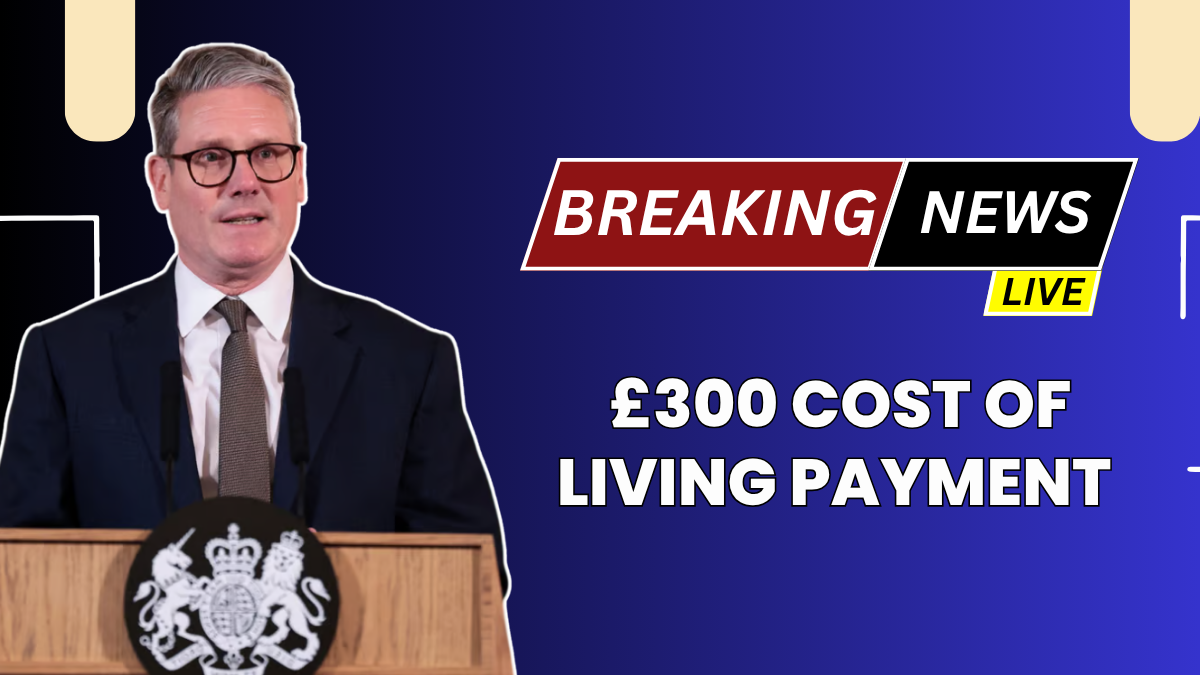The cost of living crisis has been making life harder for millions of families across the UK. Prices of everyday essentials such as food, energy, rent, and transport are still rising, and many households are struggling to make ends meet. To help ease some of this financial pressure, the Department for Work and Pensions (DWP) will be sending out a £300 Cost of Living Payment in mid-July 2025.
This one-off payment is part of the government’s wider cost of living support package and is specifically aimed at helping low-income households cope with rising bills and living costs.
Let us go through everything you need to know, including who qualifies, how the payment will be made, and what to do if you don’t receive it.
Who Will Qualify for the £300 Cost of Living Payment?
The £300 payment is targeted at people and families who are on means-tested benefits. This means that your income and savings are taken into account when determining eligibility.
To get the payment, you must have been receiving (or been eligible to receive) one of the following benefits between 5 June 2025 and 25 June 2025:
- Universal Credit
- Income-based Jobseeker’s Allowance (JSA)
- Income-related Employment and Support Allowance (ESA)
- Income Support
- Pension Credit
- Working Tax Credit
- Child Tax Credit
If you were entitled to any of these benefits during the qualifying period, you should receive the payment automatically.
This payment is meant to support the most financially vulnerable households, ensuring the help goes directly to those who need it most.
Why Are Living Costs So High Right Now?
The cost of living crisis in the UK hasn’t gone away, even though the economy is slowly improving. Several factors are still putting pressure on household budgets:
- Energy Prices: Energy costs remain high because of global supply issues. Heating homes and using electricity has become expensive for many families.
- Rising Rent: Rental prices have gone up significantly across the country, not just in cities but also in rural areas.
- Food Inflation: Food prices keep climbing, which hits low-income households especially hard. Essentials like bread, milk, and vegetables are costing more.
- Transport and Utilities: Fuel, public transport, and other utility bills have also increased, leaving less money for other essentials.
The £300 payment is designed to provide short-term relief to help people cover these growing expenses.
When and How Will the Payment Be Made?
The good news is that you do not need to apply for the £300 payment. If you are eligible, it will be paid automatically into the same account where you normally receive your benefits.
Payment details:
- Amount: £300
- Payment date: Mid-July 2025 (most payments should be completed by the end of the month)
- Eligibility period: 5 June 2025 to 25 June 2025
- How you’ll get it: Direct deposit into your benefits account
- Who sends it: Department for Work and Pensions (DWP)
- Application required? No – it’s automatic
This automatic payment system means that you won’t need to worry about extra forms or deadlines.
What If You Don’t Receive Your Payment?
Most people will get their £300 payment by the end of July 2025, but some payments may take longer because they are sent in batches.
If you think you are eligible but haven’t received the payment by the end of the month:
- Wait a few extra days – delays can happen.
- Contact the DWP directly if it still hasn’t arrived.
- Have your National Insurance number and details of your current benefits ready when you call.
Do not fall for scams. If anyone asks you to pay a fee to receive the £300 payment or asks for your bank details through email or text, ignore them. The payment is free and will come automatically if you qualify.
Why Is This Payment Important?
For many families, this £300 payment could make the difference between staying on top of bills and falling behind. It can help cover:
- A month’s worth of food shopping
- Heating or electricity bills
- Rent or mortgage payments
- Essential travel and daily expenses
The government has already made several cost of living payments over the past year, and this latest round shows their ongoing commitment to helping people who are struggling the most.
Final Thoughts
The £300 Cost of Living Payment in July 2025 is a lifeline for many UK residents. With the cost of essentials still rising, this extra money will provide much-needed breathing space for those on a low income.
You don’t need to apply, you don’t need to fill out any forms, and you won’t be asked to pay any fees. If you meet the eligibility criteria, the money will be sent straight to your bank account.
If you are unsure whether you qualify, check the list of benefits again and confirm your status with the DWP. Staying informed can help you avoid missing out on money that you are entitled to.
This payment may not solve the entire cost of living crisis, but it can ease the burden for thousands of families across the UK.
FAQs
1. What is the £300 Cost of Living Payment?
It is a one-off support payment from the UK Government to help eligible households with rising living costs.
2. Who is eligible for the £300 Cost of Living Payment?
People on certain means-tested benefits such as Universal Credit, Pension Credit, Income Support, and Jobseeker’s Allowance.
3. Do I need to apply for the payment?
No, the payment will be made automatically to eligible claimants.
4. When will the £300 payment be made?
It is set to be paid in July 2025, with the exact dates announced by the DWP.
5. How will I receive the payment?
It will be credited directly to the same bank account where you receive your benefits.
